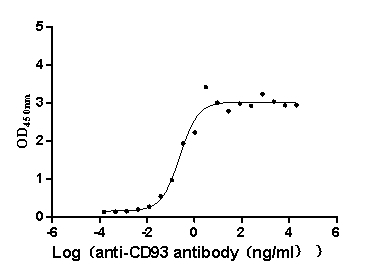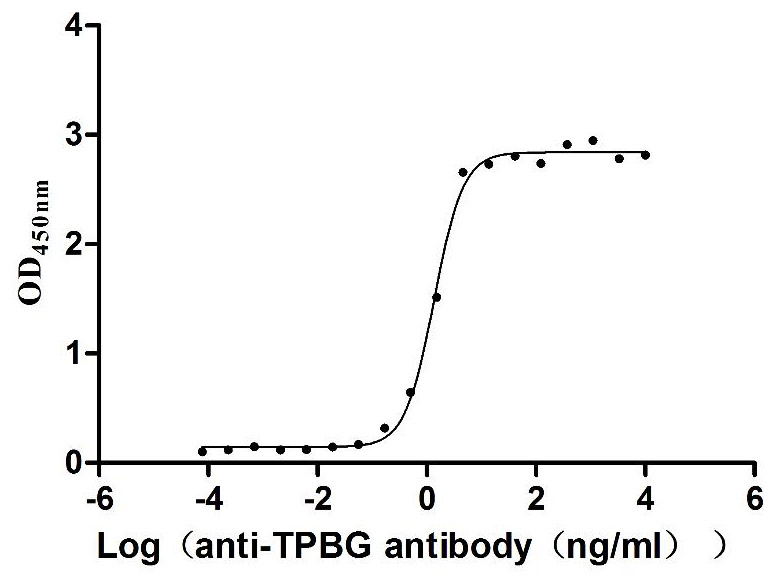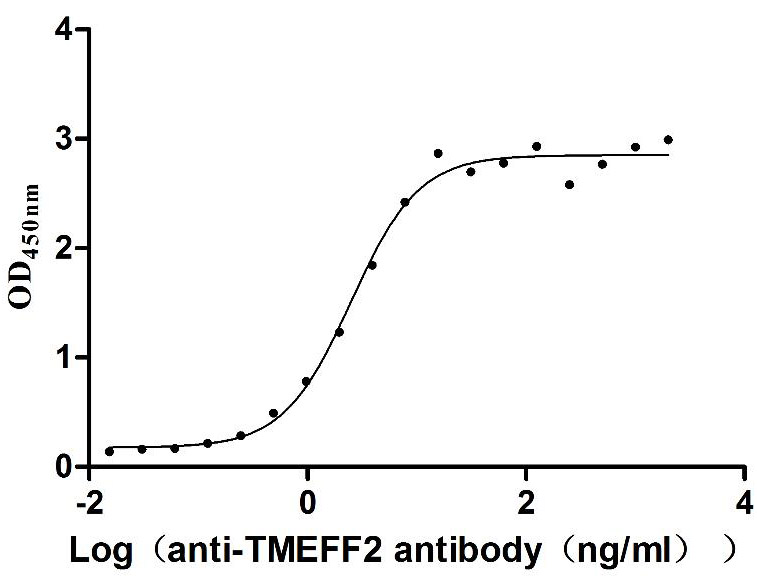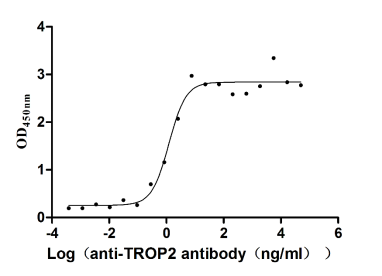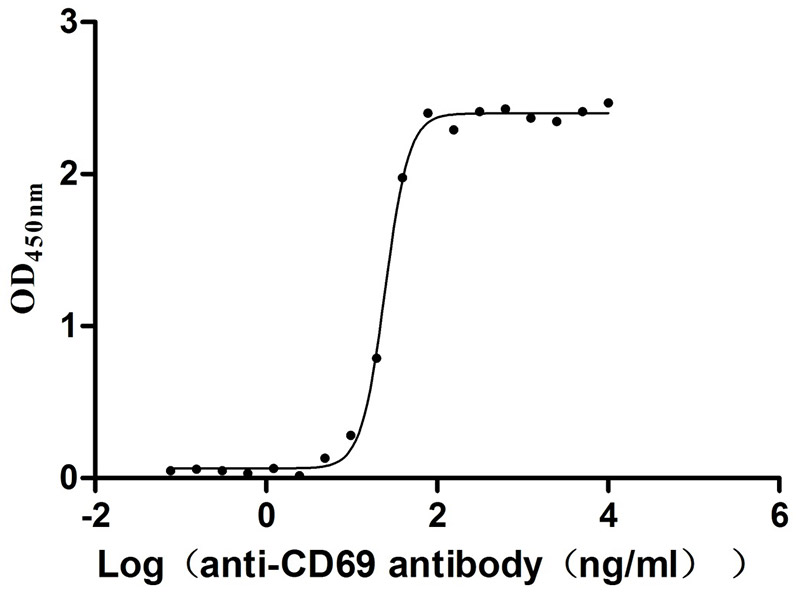Recombinant Human Progressive ankylosis protein homolog (ANKH), partial
-
中文名称:Recombinant Human Progressive ankylosis protein homolog(ANKH),partial,Yeast
-
货号:CSB-YP864030HU
-
规格:
-
来源:Yeast
-
其他:
-
中文名称:Recombinant Human Progressive ankylosis protein homolog(ANKH),partial,Yeast
-
货号:CSB-EP864030HU
-
规格:
-
来源:E.coli
-
其他:
-
中文名称:Recombinant Human Progressive ankylosis protein homolog(ANKH),partial,Yeast
-
货号:CSB-EP864030HU-B
-
规格:
-
来源:E.coli
-
共轭:Avi-tag Biotinylated
E. coli biotin ligase (BirA) is highly specific in covalently attaching biotin to the 15 amino acid AviTag peptide. This recombinant protein was biotinylated in vivo by AviTag-BirA technology, which method is BriA catalyzes amide linkage between the biotin and the specific lysine of the AviTag.
-
其他:
-
中文名称:Recombinant Human Progressive ankylosis protein homolog(ANKH),partial,Yeast
-
货号:CSB-BP864030HU
-
规格:
-
来源:Baculovirus
-
其他:
-
中文名称:Recombinant Human Progressive ankylosis protein homolog(ANKH),partial,Yeast
-
货号:CSB-MP864030HU
-
规格:
-
来源:Mammalian cell
-
其他:
产品详情
-
纯度:>85% (SDS-PAGE)
-
基因名:ANKH
-
Uniprot No.:
-
别名:ANK; ANKH; ANKH_HUMAN; Ankylosis progressive homolog (mouse); Ankylosis progressive homolog; CCAL 2; CCAL2; CMDJ; CPPDD; Craniometaphyseal dysplasia Jackson type (dominant); FLJ27166; HANK; MANK; Progressive ankylosis protein homolog
-
种属:Homo sapiens (Human)
-
蛋白长度:Partial
-
蛋白标签:Tag type will be determined during the manufacturing process.
The tag type will be determined during production process. If you have specified tag type, please tell us and we will develop the specified tag preferentially. -
产品提供形式:Lyophilized powder
Note: We will preferentially ship the format that we have in stock, however, if you have any special requirement for the format, please remark your requirement when placing the order, we will prepare according to your demand. -
复溶:We recommend that this vial be briefly centrifuged prior to opening to bring the contents to the bottom. Please reconstitute protein in deionized sterile water to a concentration of 0.1-1.0 mg/mL.We recommend to add 5-50% of glycerol (final concentration) and aliquot for long-term storage at -20℃/-80℃. Our default final concentration of glycerol is 50%. Customers could use it as reference.
-
储存条件:Store at -20°C/-80°C upon receipt, aliquoting is necessary for mutiple use. Avoid repeated freeze-thaw cycles.
-
保质期:The shelf life is related to many factors, storage state, buffer ingredients, storage temperature and the stability of the protein itself.
Generally, the shelf life of liquid form is 6 months at -20°C/-80°C. The shelf life of lyophilized form is 12 months at -20°C/-80°C. -
货期:Delivery time may differ from different purchasing way or location, please kindly consult your local distributors for specific delivery time.Note: All of our proteins are default shipped with normal blue ice packs, if you request to ship with dry ice, please communicate with us in advance and extra fees will be charged.
-
注意事项:Repeated freezing and thawing is not recommended. Store working aliquots at 4°C for up to one week.
-
Datasheet :Please contact us to get it.
靶点详情
-
功能:Regulates intra- and extracellular levels of inorganic pyrophosphate (PPi), probably functioning as PPi transporter.
-
基因功能参考文献:
- Craniometaphyseal dysplasia mutations in ANKH diminish hiPSC differentiation into osteoclasts in vitro. PMID: 29056330
- our findings demonstrate that the miR-20a/ANKH axis mediates the stiff matrix- promoted CEP calcification, suggesting that miR-20a and ANKH are potential targets in restraining the progression of IDD. PMID: 27142968
- Results show that ANK localizes to the trans-Golgi network (TGN), clathrin-coated vesicles and the plasma membrane, and is required for endosomal function and endocytosis PMID: 27466194
- This study validates the association between a functional polymorphism in the 5' UTR of ANKH and Chondrocalcinosis PMID: 24467728
- Polymorphisms in ALP, ENPP1 and ANKH are important genetic risk factors contributing to Pseudoxanthoma elasticum PMID: 25025693
- ANK was concentrated around crystal deposits and correlated with markers of chondrocyte hypertrophy. These findings support a role for ANK in CPPD crystal formation in cartilage. PMID: 24293574
- expression levels of type II collagen, aggrecan, and ANK in endplate chondrocytes of experimental group were lower than that of control group and phosphorylation level of JNK in the experimental group which was higher than that in the control group PMID: 23769559
- Exploratory tympanotomy might improve the hearing outcome in patients with this syndrome and therefore surgery has a limited audiometric benefit in general PMID: 23726953
- Analysis of the present CMD family suggested the presence of a maternal mosaicism in an ANKH mutation, and the mother who was mosaic for the ANKH mutation had no apparent clinical or radiological features of CMD. PMID: 23421944
- The aim of this study was to investigate two mineralization-related genes TNAP and ANKH polymorphisms associated with ankylosing spondylitis (AS) in the North Chinese Han population. PMID: 23612078
- Neither ANKH nor ENPP1 mutations are the cause of chondrocalcinosis in these Slovakian families. PMID: 21811784
- TNF-activated NF-kappaB promotes inflammation-accelerated vascular calcification by inhibiting ankylosis protein homolog expression and consequent pyrophosphate secretion. PMID: 22437419
- We report a novel mutation, not previously described, in ANKH exon 1, wherein serine replaces proline, in a case of early-onset severe calcium pyrophosphate disease associated with metabolic abnormalities, with similar findings in the proband's father PMID: 22647861
- These results confirm data in white Europeans that ANKH is probably not a major determinant of susceptibility to ankylosing spondylitis. PMID: 22089454
- in a cohort study of candidate genes and BMD, a few modest associations were observed between SNPs in or near ALPL and several bone traits, but no association was observed with ANKH PMID: 19888898
- Two novel 18 and 12 base pair in-frame deletions are the largest ANKH mutations causing craniometaphyseal dysplasia identified to date. PMID: 22150416
- the relationship between the type of temporomandibular disorders (TMD) and ANKH polymorphisms PMID: 22003394
- Phe377del mutation in ANK causes impaired osteoblastogenesis and osteoclastogenesis resulting in hypomineralization and a high bone mass phenotype. PMID: 21149338
- The ANKH gene was associated with all four studied obesity-related traits, body mass index (BMI), the waist-hip ratio (WHR), the epidermal growth factor receptor (EGFR), and leptin (P<0.0184), and its effects were modulated by sex. PMID: 20231843
- We describe the first human progressive ankylosis phenotype and our results indicate that ANK influences articular soft tissues commonly involved in degenerative joint disorders. also, we provide the first direct evidence for a role of ANK in the CNS. PMID: 20943778
- Following the degeneration of cartilaginous endplate, the intervertebral disc degeneration worsened and the expression level of ANK decreased in vertebral endplate chondrocytes. PMID: 20646567
- Three novel mutations in ANKH in simplex patients with craniometaphyseal dysplasia, are reported. PMID: 20358596
- Mutations in ANKH cause chondrocalcinosis PMID: 12297987
- Autosomal dominant familial calcium pyrophosphate dihydrate deposition disease is caused by mutation in the transmembrane protein ANKH. PMID: 12297989
- ANKH-OR and ANKH-TR are novel genetic markers that are significantly associated with ankylosing spondylitis. PMID: 12632434
- ANKH gene is found in patients with familial calcium pyrophosphate deposition disease. PMID: 12707589
- haplotypes among the 3 families with P5 mutations suggest the mutations arose independently and the evolutionarily conserved P5 position of ANKH may be a hot spot for mutation in families with autosomal-dominant calcium pyrophosphate deposition disease. PMID: 13130483
- ANKH is not significantly involved in susceptibility to or clinical manifestations of ankylosing spondylitis. PMID: 14558096
- Numerous ANKH gene mutations cause familial calcium pyrophosphate dihydrate deposition disease; they enhance ANKH protein activity, elevating extracellular pyrophosphate levels and promoting formation of pyrophosphate crystals. Review. PMID: 15474385
- ANKH may be a candidate gene affecting bone size and geometry variation, and thus may be relevant for osteoporosis fracture risk. PMID: 15780964
- Some cases of apparently sporadic chondrocalcinosis are caused by polymorphisms of the ankh gene. PMID: 15818664
- Data showed significant associations of ANKH gene polymorphisms with body weight and height, limb length. PMID: 16724232
- ANKH genetic polymorphisms in the area between SNP rs2291943 and rs2288474 are strongly associated with OPG plasma levels. PMID: 17147692
- mutations in ANKH cause human skeletal disease PMID: 17186460
- examined whether nine single nucleotide polymorphisms (SNPs) in ANKH-one of the key genetic factors involved in bone mineralization-can be associated with PTH and BGP levels PMID: 17403715
- Cuff tear arthropathy is associated with variants in ANKH and TNAP that alter extracellular inorganic pyrophosphate concentrations causing calcium crystal deposition. PMID: 17563703
- These results revealed a novel function of ANKH in the promotion of early erythroid differentiation and that ank/ank mice have lower serum levels of Epo than the normal littermates, and this is the likely cause of microcytosis in these mutant mice. PMID: 17950726
- The present study examines the possible phenotype-haplotype specificity of the associations in osteoprotegerin and parathyroid hormone gene regions. PMID: 18821330
- Our results suggested that there is a coordinated interrelationship between 2 key participants of Pi and PPi metabolism, ANKH and PiT-1. PMID: 19369455
- ANK expression and function in vitro and in vivo are repressed in hypoxic environments and that the effect is regulated by HIF-1. PMID: 19419319
- Craniometaphyseal dysplasia and chondrocalcinosis cosegregating in a family with an ANKH mutation are reported. PMID: 19449425
- ANKH is associated with infantile epilepsy in a large family showing complete co-segregation of seizures and chondrocalcinosis. PMID: 15461680
- ANKH is upregulated by androgen in the LNCaP prostate cell line. PMID: 12185249
显示更多
收起更多
-
相关疾病:Chondrocalcinosis 2 (CCAL2); Craniometaphyseal dysplasia, autosomal dominant (CMDD)
-
亚细胞定位:Membrane; Multi-pass membrane protein.
-
蛋白家族:ANKH family
-
组织特异性:Found in osteoblasts from mandibular bone and from iliac bone; not detected in osteoclastic cells.
-
数据库链接:
HGNC: 15492
OMIM: 118600
KEGG: hsa:56172
STRING: 9606.ENSP00000284268
UniGene: Hs.156727
Most popular with customers
-
Recombinant Human IGF-like family receptor 1 (IGFLR1), partial (Active)
Express system: Mammalian cell
Species: Homo sapiens (Human)
-
Recombinant Human C5a anaphylatoxin chemotactic receptor 1 (C5AR1)-VLPs (Active)
Express system: Mammalian cell
Species: Homo sapiens (Human)
-
Recombinant Human Microtubule-associated protein tau (MAPT) (Active)
Express system: Mammalian cell
Species: Homo sapiens (Human)
-
Recombinant Macaca fascicularis CD93 molecule (CD93), partial (Active)
Express system: Mammalian cell
Species: Macaca fascicularis (Crab-eating macaque) (Cynomolgus monkey)
-
Recombinant Human Trophoblast glycoprotein (TPBG), partial (Active)
Express system: Mammalian cell
Species: Homo sapiens (Human)
-
Recombinant Human Tomoregulin-2 (TMEFF2), partial (Active)
Express system: Mammalian cell
Species: Homo sapiens (Human)
-
Recombinant Human Tumor-associated calcium signal transducer 2 (TACSTD2), partial (Active)
Express system: Mammalian cell
Species: Homo sapiens (Human)
-
Recombinant Human Early activation antigen CD69 (CD69), partial (Active)
Express system: Mammalian cell
Species: Homo sapiens (Human)



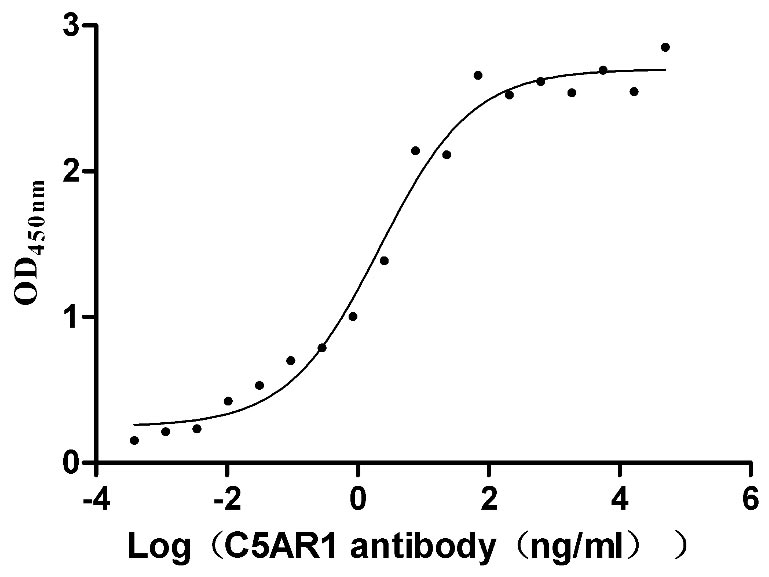
-AC1.jpg)
